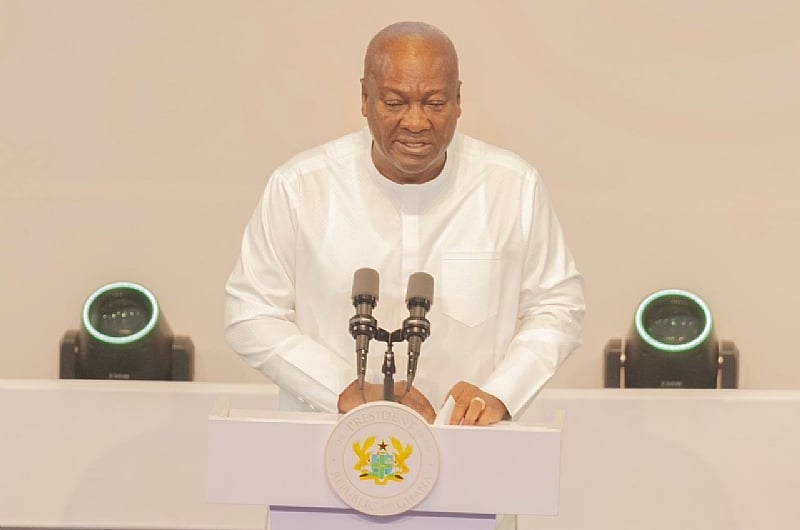President John Dramani Mahama, in a recent address, underscored his administration’s commitment to navigating Ghana towards a path of progress and prosperity. He acknowledged the weighty challenges inherited from the previous government, particularly the prevailing economic crisis that has cast a shadow over the nation’s prospects. The President, speaking at the swearing-in ceremony of six key ministers, reassured the Ghanaian populace that his government is fully cognizant of the task at hand and is prepared to confront the existing difficulties head-on, effectively “resetting” the country’s trajectory. This reset, he emphasized, will involve decisive action and a departure from past practices, signaling a new era of governance focused on tangible results and accountability.
The President’s address carried a strong message of urgency and a clear recognition of the public’s expectations. He stressed that the Ghanaian people, through their votes in the recent elections, have unequivocally expressed their intolerance for misrule and their desire for effective leadership. This mandate, he implied, serves as a driving force for his administration’s commitment to delivering on its promises and ushering in an era of improved governance and economic stability. The President’s words carried a weight of responsibility, acknowledging the significant burden placed upon his government to address the nation’s pressing concerns and to restore public trust.
Focusing on the economic front, President Mahama directly addressed Dr. Ato Forson, the newly appointed Finance Minister, highlighting the critical role he plays in revitalizing the nation’s financial health. The President articulated the public’s expectations, emphasizing the need to curb inflation, alleviate the cost of living, and bring the national debt to sustainable levels. These key objectives, he stressed, are paramount to restoring macroeconomic stability and laying the foundation for sustainable economic growth. The President’s direct address to Dr. Forson underscored the importance of the Finance Ministry’s role in navigating the current economic challenges and charting a course towards recovery.
The President also emphasized the collective responsibility of the newly appointed ministerial team. He urged them to dedicate their best efforts to their respective portfolios, emphasizing that a “business as usual” approach would not suffice. The times, he implied, demand innovative thinking, decisive action, and a genuine commitment to serving the interests of the Ghanaian people. This call to action emphasized the need for a transformative approach to governance, moving beyond conventional practices and embracing new strategies to address the nation’s challenges effectively.
The swearing-in ceremony saw the appointment of several key figures to critical ministerial positions. Dr. Ato Forson assumed the crucial role of Finance Minister, tasked with steering the nation’s economy towards stability and growth. Dominic Ayine was appointed Attorney General and Minister of Justice, entrusted with upholding the rule of law and ensuring justice for all citizens. Eric Opoku took on the responsibility of Minister for Food and Agriculture, a vital sector for ensuring food security and promoting agricultural development. These appointments signaled a strategic focus on key areas crucial for national development.
Completing the roster of new ministerial appointments, Governs Kwame Agbodza assumed the role of Minister for Roads and Highways, responsible for developing and maintaining the nation’s infrastructure. Haruna Iddrisu took charge of the Education Ministry, entrusted with shaping the future of Ghana’s youth through quality education. Finally, John Abdulai Jinapor was appointed Minister for Energy, tasked with ensuring a reliable and sustainable energy supply for the nation. These appointments collectively represent the President’s strategic vision for Ghana’s future, emphasizing the interconnectedness of economic stability, infrastructure development, education, and energy security in achieving national progress. The newly appointed ministers now bear the responsibility of translating the President’s vision into tangible results, effectively addressing the nation’s challenges and steering Ghana towards a brighter future.


